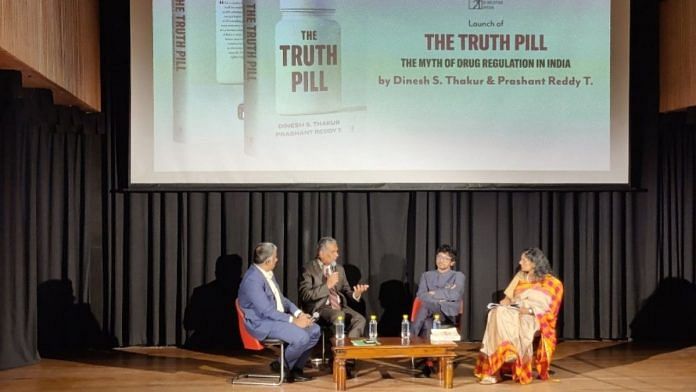Public health activist Dinesh S. Thakur and lawyer Prashant Reddy’s book Truth Pill: The Myth of Drug Regulation in India comes as an eye-opener when WHO is investigating Indian-made cough syrups that have allegedly killed more than 66 children in The Gambia, West Africa earlier this month. This incident is no anomaly, the authors revealed in their book launch at Alliance Française de Delhi Saturday. Poisonous cough syrups have also killed children in Jammu, Haryana, Maharashtra and Bihar in the past.
“If you think about it, giving cough syrup to your children these days is not different from playing Russian roulette,” Delhi-based vascular surgeon Dr Ambarish Satwik said at the book launch.
He explained how the contamination of propylene glycol—a solvent used in cough syrups—causes acute kidney failure and is dangerous enough to kill children. Dr Satwik took philosopher Hannah Errant’s help to describe what makes pharmaceutical companies peddle poison in the guise of medicine—it’s a mix of pure evil and ignorant forces at work.
Also read: Ranitidine off essential meds list but India still sells ‘cancer-causing’ antacid shunned by world
India’s drug regulation problem
Truth Pill, published by Simon and Schuster India, is a product of intense research and hard work. It focuses on the deplorable state of drug regulation in India, and is analytical to a point where it will make you think about every pill you have ever popped. The genesis of this book was a Public Interest Litigation (PIL) filed by Dinesh Thakur and Prashant Reddy in 2016. Thakur is the whistleblower who exposed unfair trade practices at Ranbaxy in 2013, while Reddy is a lawyer specialising in drug regulation. It took more than 400 RTIs and several court hearings to fill the book with information the public should have access to. We don’t think about medicines until we really need them. The authors hope to change this general approach, which is why they have also uploaded all their resources on a website.
“There is a lack of political will to crack the whip,” Thakur said while highlighting a severe lack of expertise in the drug regulatory department.
“Thousands of drugs manufactured before 2017 [were] not tested for bioequivalence—a property that makes medicine dissolve with blood,” quipped Reddy.
Thakur maintains India’s drug regulation ecosystem is in shambles. “One of the major issues with the system of regulation is that we have every state and Union territory giving approvals for drugs in India. When a medicine doesn’t get approval from Central Drugs Standard Control Organization (CDSCO), manufacturers just add a few vitamins to make it seem different and to get it approved from any state,” he said.
Also read: How desi Dolo 650 outsold MNC GSK’s Crocin, became India’s ‘favourite snack’ in Covid waves
Revealing harsh truths
Dr Satwik revealed one of the book’s findings to the audience—in Baddi, Himachal Pradesh, there are 690 drug manufacturing units and not a single testing lab.
“Doctors are so clueless about what medicine to prescribe because, for all you know, pharma companies are sourcing drugs manufactured in a DDA flat,” he said. He also added that doctors are not given adequate education on the impact of drugs on the human body.
“If there was ever a time to make the personal political, it is now. And you should all take this personally,” he said.
Reddy chimed in with some food for thought. “Get angry. Your anger is the only hope we have.”
(Edited by Zoya Bhatti)



